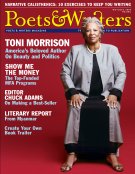I ask him to tell her that perhaps we can meet at Brown University in late summer. Weeks after my trip to Myanmar, fiction writer Robert Coover, who oversees the fellowship at Brown, tells me that Dr. Ma Thida appears to be suffering from "a certain amount of electronic surveillance and harassment during her present stay in Myanmar." His impression is based on the fact that the doctor's e-mail accounts keep getting deleted, and he apologizes for not being able to offer me a working e-mail address to contact her. She has been given permission to go south into the Irrawaddy Delta, he tells me, and she has been working long hours treating the cyclone victims.
I think back to something an English-speaking Burmese told me as I walked back from the City Star Hotel the day Dr. Ma Thida canceled our appointment. As we watched a handful of men work at the trees with machetes, the stranger turned to me. "In a country where there is no help from the government, we help ourselves," he said, then quickly slipped back into the crowd.
On the plane ride from Yangon back to Beijing, I sit next to a German salesman dressed in black slacks and a black short-sleeved button-down with a black Rolex on his wrist. His name is Peter, and he is sixty. His wife is Burmese and from a powerful political family, and Peter maintains profitable relationships with the ruling junta. He makes a good living supplying several small factories scattered throughout the country with spare parts. He tells me that his wife oversees a small medical clinic that he funds in a town north of Yangon. This fact makes me want to overlook his social and business connections with the ruling junta—until he begins to generalize about both the regime and the Burmese people.
"They're lazy," Peter says, then explains that without the military junta in charge, the people's indolence would cause them to starve to death. He's certain that the dictatorship will do everything necessary to care for the victims of the cyclone in the south. It's Peter's contention that a regime that routinely tortures its political opponents, that represses its artists and censors its writers, a regime that held a free election in 1990 then locked many of the victors in jail, is necessary to keep a country that is among the poorest in the world from slipping further into poverty and despair.
Although I've changed the names and descriptions of several people I met while writing this article, sadly, Peter has not been fictionalized in any way.
Postscript: As I write this, more than eight weeks have passed since my trip, and an estimated two million rice farmers are still suffering from the effects of the cyclone. The military junta continues to restrict access to the area and appears more intent on suppressing the efforts of Burmese citizens to spread videos and firsthand accounts of the devastation than they are in assisting efforts to distribute food and medical care to the victims.
Robert Coover recently wrote me a second note stating that Ma Thida would be happy to correspond with me by e-mail, and I have exchanged several messages with her. In them, she describes her work at a free Muslim clinic in Yangon working with cyclone victims. "They, the delta people, have been ignored by both the government and international NGOs in terms of health care for so long," she writes. "So we sadly found the medical needs of the delta to be huge. Health care facilities and infrastructure are so weak there. On top of that, most medical teams just focused on clinical treatment and they didn't provide any follow-up activities and health educational activities. So we fulfilled that blank."
I ask her how her work as a doctor is related to her writing. "I love to be with and work with people," she writes. "That is what made me become a medical doctor and writer. Listening to people's feelings, thoughts, and suffering inspired me to treat or help them and write about them. My area of specialization is general surgery. I love surgery a lot. Beneath the skin, everything is awesome, wonderful and different. To correct, repair and remake weakness and abnormality of body parts is such an interesting work for me. While I do surgery, I am feeling I am doing an art."
She reports that her first and only novel was allowed to be published by "the scrutiny board" in 1993, but several months later she was arrested for "endangering the public peace, having contact with illegal organizations, and distributing unlawful literature," and it was banned. After her release in 1999 (international pressure from organizations like Amnesty International and foreign governments succeeded in commuting her sentence), editors were reluctant to print her work, and the censors rejected her short stories. It wasn't until "late 2000," when she wrote some nonfiction articles, that she was permitted to publish again.
"Finally, I can write now, but still under thorough scrutiny. But I love writing. I can't help it. I can't stop sharing my feelings, thoughts, knowledge, empathy, concerns and blessings with people and readers. So I continue writing."
Stephen Morison Jr. teaches literature and writing at School Year Abroad China in Beijing. His article "Chinese Characters: Report From Literary Beijing" appeared in the May/June 2008 issue of Poets & Writers Magazine.









